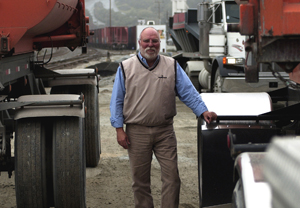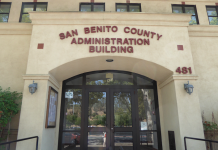Local operations not targeted in House reform bill
When the General Mining Act of 1872 was passed into law, mining
activities in the West consisted of a man with a pick ax and a
mule.
Today, mining is a multi-billion dollar industry.
Local operations not targeted in House reform bill
When the General Mining Act of 1872 was passed into law, mining activities in the West consisted of a man with a pick ax and a mule.
Today, mining is a multi-billion dollar industry.
“Mining has changed a lot over the past 135 years,” said Dalal Aboulhosn, legislative assistant for Earthjustice, an environmental group.
The House of Representatives voted on Nov 1 to pass a bill that would reform the Mining Act.
This is a, “very long overdue bill, reforming a very antiquated law,” Aboulhosn said.
The Mining Act was originally intended to help settle the West. It governs the extraction of hard rock minerals on public land, according to the Congressional Budget Office.
There are 19 active mines in San Benito County, said Byron Turner, planner for San Benito County.
No mines in the county are governed by the Mining Act, according to Jim West, a spokesman for the largest mining operation in the county, Graniterock.
Mining operations in the county extract mostly construction material. Hard rock mining operations extract hard metals, such as copper, gold, silver, and uranium, according to the Congressional Budget Office.
Businesses that remove other minerals pay the government a royalty on minerals taken from public land.
“Industries like coal have been paying royalties for years,” Aboulhosn said.
Under the Mining Act, Operators of hard rock mines do not pay a royalty. People who hold more than 10 mining claims on public land pay an annual fee of $125 per claim, according to the Congressional Budget Office.
The production value of hard rock minerals from public land is about $1 billion per year, according to the same document.
The reform bill would establish an eight percent royalty on new hard rock mines on public land and a four percent royalty on existing mines, according to the bill.
The bill would also place sensitive land, such as National Forest Roadless Areas, off limits to new mines, Aboulhosn said.
“Under the old law, even sensitive land is considered open for mining,” she said.
When the Mining Act was passed, environmental laws, such as the Clean Air Act and the Clean Water Act, did not exist. A law designed in 1873 cannot address all of the impacts of mining, West said.
“You cannot operate today with a permit that was designed in 1872,” West said. “It would be unconscionable.”
The reform bill targets states that are less regulated than California, he said. Mining operations in California must comply with strict environmental laws.
In California, a permit under the Mining Act, “would be a very nice first step, but it is a 20-step process,” West said.
West has worked in the mining industry for more than 30 years.
“When I look at what we used to do,” West said, referring to mining, “I shudder.”
Mining in the West “has contaminated stream reaches in the headwaters of more than 40 percent of the watersheds in the West,” according to a 2004 Environmental Protection Agency publication from the Office of the Inspector General.
Hard rock mining can cause significant environmental impacts, including the degradation of air, water, soil, vegetation, aquatic life, wildlife and human health.
The metal mining industry was the largest toxic polluter in 2000, according to the document. The industry was responsible for 47 percent of toxics released by industry in the United States.
If the bill were signed into law, the royalties would help pay to clean up after hard rock mining operations, Aboulhosn said. Under the Mining Act, taxpayers fund the clean up.
Cleaning up after hard rock mines can be expensive. The EPA Office of the Inspector General identified 156 hard rock mines that could cost between $7 billion and $24 billion to reclaim.
That is more than 12 times EPA’s total annual Superfund budget. Superfund is a federal environmental program. The superfund budget is used to clean hazardous waste sites.
The National Mining Association, a trade organization for the mining industry, opposes the reform bill, said Carol Raulston, senior vice president for communications for the National Mining Association.
“This bill would make it very hard to operate existing mines,” Raulston said, referring to royalties.
The bill would establish the world’s highest royalty on hard rock minerals, Raulston said.
“The challenge for hard rock mining in the United States is to be competitive with the rest of the world,” she said.
Aboulhosn does not think the royalties would place an undue burden on hard rock mining operations. The coal mining industry has been paying an 8 percent royalty or more for years, she said.
“We don’t want to stop hard rock mining, we just want it done more responsibly,” she said.
Most hard rock mining is done on public land, Raulston said. That is because most hard rock minerals are found in the West.
“Half of all federally owned land is already off limits to any kind of mining,” she said. “We’re just in a few places.”
Aboulhosn disagrees.
“I don’t know where they get their numbers from,” Aboulhosn said.
The EPA estimates that there are about half a million abandoned mines on Bureau of Land Management Land, 35,000 on Forest Service land, and 2,500 on National Park Land, Aboulhosn said.
The House bill is a first step, Aboulhosn said.
“Our next step is now to work with the Senate to pass a law that will also be strong on environmental protections for hard rock mining,” Aboulhosn said.







